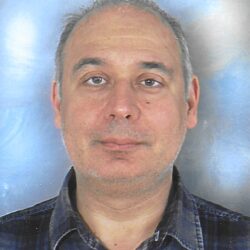SCIENCE & TECHNOLOGY OF MATERIALS IN ART

The Science of Materials studies and seeks to explain the relationship between the composition, structure, and processes of formation or synthesis of a material and its microscopic and macroscopic properties.
The Technology of Materials, on the other hand, focuses on the design, manufacture, and processing of materials with the aim of producing a final product suitable for specific applications and uses.
In contemporary artistic practice, the vast array of available materials – both natural and synthetic – offers numerous creative opportunities. A sound understanding of the above fundamental principles can empower the artist to explore innovative means of expression. Whether selecting materials directly from nature, recycling and reusing collected materials, or even purchasing the most suitable commercial product ready for use (based on quality and cost criteria), a foundational knowledge of the properties and appropriate use of materials is essential.
Most importantly, issues of personal safety, the protection of others, and environmental protection, both in the short and long term, are integral to working with materials in the context of art. This necessitates the ability to identify materials prior to use, understand their handling requirements and necessary safety precautions, and appropriately sort and manage waste after use. Concepts such as sustainability, environmental responsibility, and the circular economy are increasingly present in everyday practice and form an important thematic area of the course.
The course Science and Technology of Materials in Art is taught over two semesters (STM I and STM II).
In the winter semester, through the aforementioned approach, students explore and learn about the properties of Rocks, Metals and Alloys, Glass and Glazes, Binders and Inorganic Pigments (Unit 1). In Unit 2, attention shifts to Organic Materials, i.e. organic compounds and solvents, adhesives and binding media, plastics and elastomers, varnishes, writing and printing materials, among others. The semester concludes with instruction on the safe use of materials, hazard pictograms, and best practices for handling and disposing of materials.
In the spring semester, the focus moves to the substrates commonly used in works of art, the layered structures of materials, and methods of material deposition, such as thin films, multilayer materials, and free-form surfaces. In the second unit of the spring semester, students investigate the interaction between matter, the environment, and radiation, i.e. the structure and properties of matter, types of radiation and their interactions, and environmental factors contributing to material degradation. The semester concludes with a study of key concepts and best practices in sustainability, environmental responsibility, and the circular economy, aimed at promoting environmental protection.
MONDAY: 10:00 – 16:00
WEDNESDAY: 10:00 – 16:00
FRIDAY: 10:00 – 17:00

HARIS RETSOS / Laboratory Teaching Staff
Dr. Haris Retsos has Scientific Interest on the topics of Art Materials and Properties, Environmental Sustainability in Art Exhibitions, Sustainable Development, Surface and Interfacial Properties, Thin Films, Responsive Materials, Polymer Adhesion, Aging and fracture of Organic Materials, Polymer Mixture, Nanocomposites, etc.
He has joined ASFA’s Faculty Personnel at 2017 and since then he teaches, in two semesters, the courses on Science and Technology of Materials for Artists.
He has PhD, MSc and Bc from the Physics Dept. of the University of Crete, Greece.
Since he has joined ASFA, he has gained extensive experience in managing a diverse range of multidisciplinary, cross-sectoral, and transnational large-scale projects in complex environments, such as:
· Coordinator and Strategic Expert, “Support of the ASFA Strategic Committee”, NSRF (ESPA) 2014-2020,
· Coordinator and Work Group Member, “Digital transformation and enhancement of the Athens School of Fine Arts’ Cultural Reserve, 1837- 2021”, NSRF (ESPA) 2014-2020,
· Coordinator and STEAM Expert, “Didactic of Fresco for Children / The Greek Painting Tradition in Secondary Education Context”, Hellenic Foundation for Research and Innovation.
· Coordinator and STEAM Expert, “Conservation, Restoration, Sustainability and Promotion of the ASFA Art Collection”, EPA 2021-2024 Ministry of Education Development Funds.
· Scientific Responsible, “Support actions for the Management Structure of the Athens School of Fine Arts, ELKE”, ESPA 2014-2020.
· Coordinator and Work Group Member,“Art Exhibition of ASFA’s Collection for the τα 60 years of the European Social Fund”,
o “Art Exhibition of ASFA’s Collection at the Ministry of Financial Development for the 30 years of Cohesion Policies in EU”,
o “Art Exhibition of ASFA’s Collection in Ministry of Migration & Asylum – Art without Borders”,
o “Art Exhibition of ASFA’s Collection in Independent Authority of Public Income”. of Public Income”.
His academic research career is on the topic of theoretical and experimental issues of Polymer Science and Engineering, and he has worked as researcher at the:
- Department of Materials, University of California Santa Barbara, CA, USA,
- Institut de Biologie Structurale, Commissariat à l’Energie Atomique (Grenoble, France),
- Ecole Supérieure de Physique et de Chimie Industrielles, (Paris, France) and
- Department of Material Science & Engineering, Cornell University (Ithaca, NY, USA).
He has also an extensive administrative work experience in Greece as:
- Executive Scientific Staff at National Exams Organization – Independent Authority, Ministry of Education
- Project Manager at Managing Authority – National Strategic Reference Framework, Ministry of Education
- Administrative Associate Personnel on Management of Human Resources for Public Sector Secondary Education at Ministry of Education,while he has participated in National Scientific Committees and Work Groups as:
o Coordinator of the working group of Ministry of Education on the topic of “Analysis and Documentation of quantitative and qualitative indices in Greek Education”,
o Coordinator of working group and National Expert at the Committee of Ministry of Education at the topic of “Economic Analysis of the Greek Educational System”,
o Expert at the Committee of Ministry of Education on the topic of “Analysis and Policy Making of Structural Funds Direction for ESPA 2021-2027 on the topics of Greek Ministry of Education”.
He has also an extensive experience in managing a wide range of multidisciplinary, cross-sectorial, transnational large projects in a complex environment as:
· Coordinator and Strategic Expert, “Support of the ASFA Strategic Committee”, NSRF (ESPA) 2014-2020,
· Coordinator and Work Group Member, “Digital transformation and enhancement of the Athens School of Fine Arts’ Cultural Reserve, 1837- 2021”, NSRF (ESPA) 2014-2020,
· Coordinator and STEAM Expert, “Didactic of Fresco for Children / The Greek Painting Tradition in Secondary Education Context”, Hellenic Foundation for Research and Innovation.
· Coordinator and STEAM Expert, “Conservation, Restoration, Sustainability and Promotion of the ASFA Art Collection”, EPA 2021-2024 Ministry of Education Development Funds.
· Scientific Responsible, “Support actions for the Management Structure of the Athens School of Fine Arts, ELKE”, ESPA 2014-2020.
· Coordinator and Work Group Member,“Art Exhibition of ASFA’s Collection for the τα 60 years of the European Social Fund”,
o “Art Exhibition of ASFA’s Collection at the Ministry of Financial Development for the 30 years of Cohesion Policies in EU”,
o “Art Exhibition of ASFA’s Collection in Ministry of Migration & Asylum – Art without Borders”,
o “Art Exhibition of ASFA’s Collection in Independent Authority of Public Income”. of Public Income”.
He has published 23 scientific articles while he has 32 participations in International Scientific Conferences.
